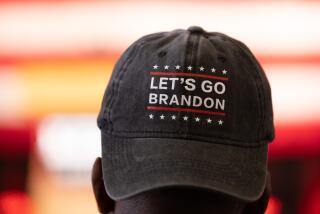Living in the Past
- Share via
WASHINGTON — Arizona Sen. John McCain will not be the Republican nominee for president. Yet, his meteoric, purposely divisive campaign may someday enable him to claim a more significant place in U.S. history. Candidates who throw a serious scare into their party’s establishment have often been catalysts of change. They never wind up in the White House, but their insurgent ideas and energy can transform the political landscape and force the men who do get elected to sing their tune.
In 1896, conservative Democrats blamed William Jennings Bryan, accurately, for splitting his party and betraying its laissez-faire tradition. Bryan and fellow rebels from the West and South shot back that President Grover Cleveland, a fellow Democrat, was enriching financiers while ignoring the plight of workers and small farmers who were enduring a long depression. “If you legislate to make the masses prosperous,” thundered Bryan, “their prosperity will find its way up through every class that rests upon them.” With such phrases, Bryan grabbed the presidential nomination, only to lose in the fall to William McKinley, candidate of a united GOP that outspent him 10-1. The Republicans would dominate national politics until the 1930s.
But Bryan had begun to alter the terms of public debate. Bolstered by a large and durable following, the “Great Commoner” remade the Democrats into the standard-bearers of modern liberalism. Under Bryan’s leadership (he ran twice more for the presidency), his party pushed for energetic antitrust prosecutions, minimum-wage laws, measures to subsidize farmers and protect union organizers and an amendment establishing the federal income tax. Under Theodore Roosevelt, who became president after McKinley was assassinated in 1901, many Republicans edged toward the same agenda, albeit with less incendiary language than the evangelical Bryan had used.
After Roosevelt left the White House, conservatives recaptured control of the governing GOP. In 1912, the former president won a slew of Republican primaries and stormed into the convention determined to wrest the nomination from the “standpatters” who stood in his path. “We stand at Armageddon, and we battle for the Lord,” he told supporters. But, in those days, the party establishment chose most of the delegates, and Roosevelt and his insurgent allies departed in outrage.
They soon confirmed the split by launching the Progressive (or Bull Moose) Party. Running as the new party’s nominee that fall, Roosevelt took millions of votes that would have otherwise gone to the GOP. The beneficiary was Democrat Woodrow Wilson, who began to carry out a similar reform agenda once he and his party swept into the White House and took control of Congress.
McCain admires Roosevelt’s iconoclastic vigor, but he is unlikely to lead an exodus from the contemporary GOP. The major parties no longer claim the fierce loyalty of millions as they did in the days of Roosevelt and Bryan. But they still have the legal and fund-raising prowess to frustrate the ambitions of third parties. McCain must know he lacks the credibility, organization and cash to win more electoral votes than both Bush and Gore.
He could find a more apt historical exemplar right at home in Arizona. In 1964, Barry M. Goldwater accomplished what McCain set out to do this year: He captured the Republican Party with an insurgency galvanized by his personality and the aura of change he represented. Ironically, Goldwater, also a wartime pilot, was the candidate of stalwart conservatives, most of whose progeny signed up early in the 2000 campaign with George W. Bush. But in the early 1960s, the right was an unruly throng of activists determined to topple the well-heeled, complacent party establishment. “They were uncontrollable,” recalled a moderate Republican from Ohio about the Goldwaterites. “They cared nothing about the Republican Party, only about their hero.”
That year, the activists and their hero got crushed in the general election. But they kept building the conservative movement, both inside and outside the GOP, and learned to take advantage of liberal failures. By the late 1980s, their determination to cut social programs and seek victory over communism had become the conventional wisdom. Along with Bryan, Goldwater became one of the most influential losers in U.S. political history.
To qualify for that somewhat dubious honor, or to actually win the nomination as a reformer in 2004, McCain will have to demonstrate that his surge this winter was more than a personal, media-driven affair. Presidential campaigns often showcase feisty rebels against the party establishment who mistake adoring crowds for a broad insurgency. George C. Wallace in 1972, Gary Hart in 1984 and Patrick J. Buchanan in 1992 and 1996 proved to be mere barometers of discontent rather than inciters of mass movements.
It’s not clear whether anger at big money in politics, McCain’s signature issue, burns in the popular imagination the way that arrogant “trusts” and patronizing “limousine liberals” did for earlier generations of voters. After learning the disappointing results on Super Tuesday, McCain told supporters in Los Angeles, “Our crusade continues tonight, tomorrow, the next day, the day after that and for as long as it takes to restore America’s confidence and pride in the practice and institutions of our great democracy.”
But, apart from a few journalists and professional watchdogs, not many Americans can point to specific outrages caused by the current system of campaign finance or can articulate how “soft money” hurts them or those they care about. If the issue remains merely a symbol of Americans’ cynicism about politicians, it cannot anchor a movement that might convince us to care passionately about politics again.
More to Read
Get the L.A. Times Politics newsletter
Deeply reported insights into legislation, politics and policy from Sacramento, Washington and beyond. In your inbox twice per week.
You may occasionally receive promotional content from the Los Angeles Times.










